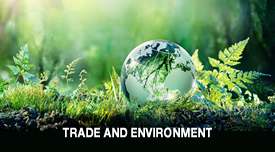The Agenda 2030 for Sustainable Development has shaped a framework for global governance that responds to a complex and interconnected global landscape.
With the Sustainable Development Goals (SDGs), the Agenda recognizes that trade is a key element in addressing fundamental issues such as food security, nutrition and promotion of sustainable agriculture (SDG 2), healthy lives and wellbeing (SDG 3) economic growth (SDG 8), inequality (SDG 10), ocean, seas and marine resource (SDG 14), and global partnership for sustainable development (SDG 17).
Agricultural and seafood trade play a major role, particularly in developing countries, LDCs and SIDs, in enabling conditions for facilitating structural transformation, mobilizing different sources of finance, and assuring job creation and social inclusion.
Moreover, trade contributes to global food security by balancing food deficits and surpluses across countries, thereby ensuring stable supplies and contributing to price stability.
Considering the significant risks of climate change to agricultural production and fisheries, trade is likely to become even more significant in the future as food demand grows in regions where productivity gains will not be sufficient to meet demand growth.

© Trainer Academy (https://traineracademy.org/)
However, in order to assure that the potential of agricultural and seafood trade is optimally used to achieve sustainable development, it is important to further reinforce the multilateral trading system and ensure that trade policies and strategies are coherent with other enabling national policies (such as agricultural, health and marine resources management etc.).
The session will discuss the relation between trade and the SDGs, the frameworks where agricultural and seafood trade are currently managed, and raise questions on how agricultural trade can be better tailored to achieve the SDGs.
The questions to be addressed include:
- What opportunities trade offers to enable the achievement of the SDGs related to agriculture, fisheries, food security and nutrition?
- How can agricultural trade and trade in fish be beneficial for sustainability and play an important role in improving economic growth, reducing inequality, address unfair competition (subsidies) and supporting sustainable development?
- What can be the effect of plurilateral and regional trade agreements (RTAs) in the agricultural trade framework? Can this support further the implementation of the Sustainable Development Goals?
- How should national complementary policies be managed to ensure that the beneficial effects of agricultural trade are equally shared by countries and populations?
- How can we implement early harvest targets of the SDG 14 (targets 4 and 6) by 2020?






